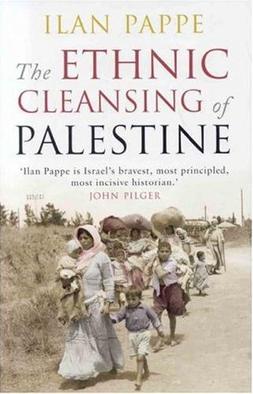In dit artikel drie bronnen die stuk voor stuk laten zien hoe Israël een Etnische Zuivering pleegde op de Palestijnen in 1948.
Als eerste een Israëlische documentaire die ingaat op de moordpartijen die plaatsvonden na de overgave van de lokale bevolking in Tantura. Verteld vanuit het gezichtspunt van Israëlische veteranen. Vervolgens een boek van de Joodse historicus Ilan Pappe. Hij gaat diep in op deze materie en komt met een sterk boek vol met bronnen over de etnische zuivering van Palestina. En tot slot een documentaire die het verhaal vanuit de Palestijnse hoek belicht. Het is een 4 delige serie over wat in de Arabische wereld bekend staat als Al Nakba oftewel De Catastrofe.
Persoonlijk vond ik het zeer leerzaam en vanuit deze hoek gezien is wat er momenteel in Gaza gebeurt ook beter in context te plaatsen.
The Tantura massacre took place on the night of 22–23 May 1948
Around 40–200 Palestinian Arab villagers from Tantura were massacred by Israel’s Haganah, namely the Alexandroni Brigade. The massacre occurred following Tantura’s surrender, a village of roughly 1,500 people in 1945 located near Haifa. The victims were buried in a mass grave, which today serves as a car park for the nearby Tel Dor beach.
In the war of 1948 hundreds of Palestinian villages were depopulated. Israelis call it ‘The War of Independence. Palestinians call it ‘Nakba”‘. The film examines one village- Tantura and why “Nakba” is taboo in Israeli society. Watch the documentary here:
The Ethnic Cleansing of Palestine by Ilan Pappe.
 The Ethnic Cleansing of Palestine is a book authored by New Historian Ilan Pappé and published in 2006 by Oneworld Publications. The book is about the 1948 Palestinian expulsion and flight, which Pappe argues was the result of ethnic cleansing.
The Ethnic Cleansing of Palestine is a book authored by New Historian Ilan Pappé and published in 2006 by Oneworld Publications. The book is about the 1948 Palestinian expulsion and flight, which Pappe argues was the result of ethnic cleansing.
The thesis of the book is that the displacement of the Palestinians during the 1948 Palestine war was an objective of the Zionist movement and a must for the establishment of Israel as a Jewish state.[1] According to Pappé, the 1948 Palestinian expulsion and flight resulted from a planned ethnic cleansing of Palestine that was implemented by David Ben-Gurion and a group of advisors referred to by Pappé as “the Consultancy”.[2][3] The book argues that the ethnic cleansing was put into effect through systematic expulsions of about 500 Arab villages, as well as terrorist attacks executed mainly by members of the Irgun and Haganah troops against the civilian population. Ilan Pappé also refers to Plan Dalet and to the village files as a proof of the planned expulsions.[4]
Al-Nakba: The Palestinian catastrophe – Episode 1
Al-Nakba: The Palestinian catastrophe “The Nakba did not begin in 1948. Its origins lie over two centuries ago….” So begins this four-part series on the ‘nakba’, meaning the ‘catastrophe’, about the history of the Palestinian exodus that led to the first Arab-Israeli war in 1948, and the establishment of the state of Israel.
This sweeping history starts back in 1799 with Napoleon’s attempted advance into Palestine to check British expansion and his appeal to the Jews of the world to reclaim their land in league with France. The narrative moves through the 19th century and into the 20th century with the British Mandate in Palestine and comes right up to date in the 21st century and the ongoing ‘nakba’ on the ground.
Arab, Israeli and Western intellectuals, historians and eye-witnesses provide the central narrative which is accompanied by archive material and documents, many only recently released for the first time. For Palestinians, 1948 marks the ‘nakba’ or the ‘catastrophe’, when hundreds of thousands were forced out of their homes. But for Israelis, the same year marks the creation of their own state. This series attempts to present an understanding of the events of the past that are still shaping the present.
This story starts in 1799, outside the walls of Acre in Ottoman-controlled Palestine, when an army under Napoleon Bonaparte besieged the city. It was all part of a campaign to defeat the Ottomans and establish a French presence in the region. In search of allies, Napoleon issued a letter offering Palestine as a homeland to the Jews under French protection. He called on the Jews to ‘rise up’ against what he called their oppressors. Napoleon’s appeal was widely publicised. But he was ultimately defeated. In Acre today, the only memory of him is a statue atop a hill overlooking the city. Yet Napoleon’s project for a Jewish homeland in the region under a colonial protectorate did not die, 40 years later, the plan was revived but by the British.

Many of you wanted clarity on the subject of Palestine and the current conflict. This, from Holocaust survivor Dr. Gabor Maté (on my podcast Under The Skin) is the most beautiful and powerful testimony on this subject I’ve ever heard. From someone with deep connections to the history of this situation